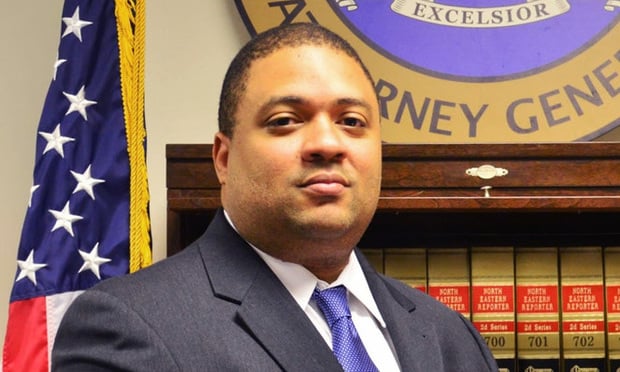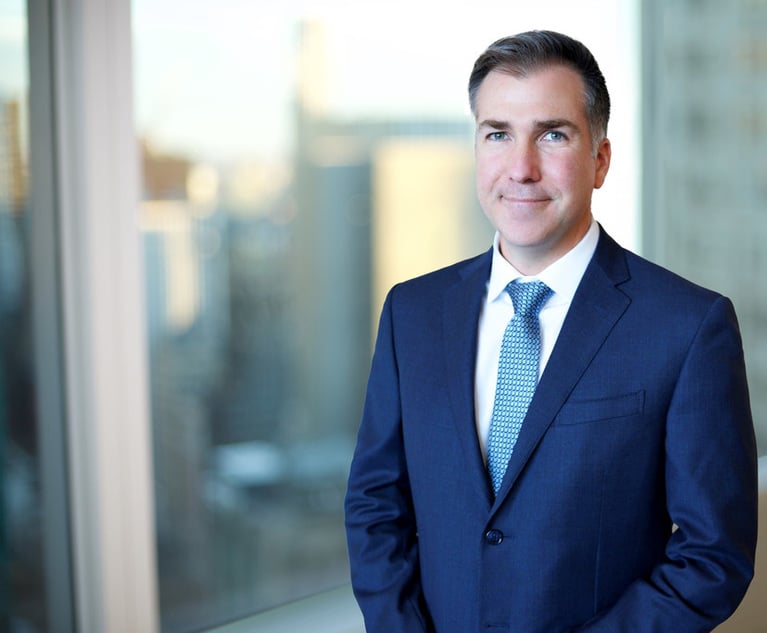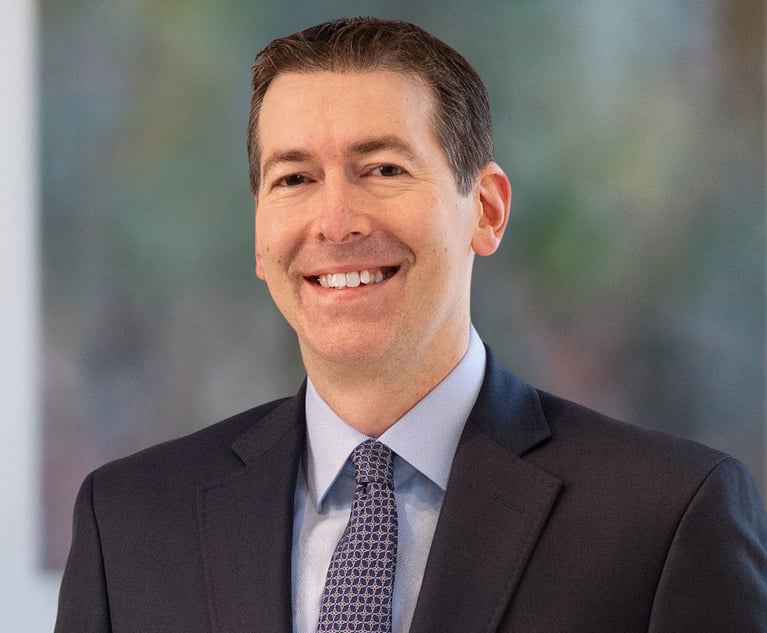NY Chief Deputy AG Heading to New York Law School Teaching Post
The move has apparently been in the works for months now and is the result of a long-standing relationship between Bragg and New York Law School Dean Anthony Crowell.
December 10, 2018 at 11:04 AM
6 minute read
 Alvin Bragg (Courtesy photo)
Alvin Bragg (Courtesy photo)
Alvin Bragg, a chief deputy attorney general under New York Attorney General Barbara Underwood, is set to take the next step in his career come January when he transitions from more than a decade in government service to join the faculty at New York Law School.
Aside from his new role as professor, Bragg also will serve as co-director of New York Law School's Racial Justice Project, a legal advocacy organization that examines issues of racial inequity and works to address them through litigation and policy recommendations.
The move has been in the works for months now and is the result of a long-standing relationship between Bragg and New York Law School Dean Anthony Crowell. Crowell was counsel to New York City Michael Bloomberg when Bragg was chief of litigation and investigations for the New York City Council. Crowell said in an interview that he's been trying to recruit Bragg ever since.
“Alvin and I have known each other for more than a decade, and we've stayed in touch over the years,” Crowell said. “I have to say for New York Law School, it's quite an extraordinary opportunity to be able to recruit him, and we're very excited. It's long been a goal of mine to get Alvin as part of this community.”
It's the first time Bragg will work in a position outside government since 2003, when he had his first stint in the state attorney general's office under then-Attorney General Eliot Spitzer. Before that, he started his career in law as an associate at Morvillo Abramowitz Grand Iason & Anello in Manhattan, where he split his time between white collar fraud and a civil rights cases.
It's not uncommon for attorneys who spend much of their career in public service to serve in several different capacities over time. The same is true for Bragg.
He left his position at the New York City Council to join the U.S. Attorney's Office for the Southern District of New York under former U.S. Attorney Preet Bharara in 2009. He stayed there until he joined the state attorney general's office in 2013.
The cases Bragg worked on as a federal prosecutor are notable. He was on the team that brought charges against former state Senate Majority Leader Malcolm Smith for allegedly attempting to influence the 2014 election for New York City Mayor. Smith was convicted after Bragg left Bharara's office.
He was also on a major case brought by the U.S. Attorney's Office against a Texas businessman who was charged with laundering money for a cartel in Mexico.
“The case that may have gotten the most attention was a money laundering case against Vikram Datta, who ran a $30 million wholesale perfume business on the Texas-Mexico border, and we alleged and convicted him for laundering millions of dollars for the Sinaloa Cartel,” Bragg said.
His role in newsworthy litigation did not stop when he left Bharara's office. Most recently, Bragg was involved in the special prosecution of Rensselaer County District Attorney Joel Abelove, who faced charges of misconduct and perjury after allegedly lying to a grand jury, which was convened to examine Abelove's handling of the death of an unarmed civilian killed by police. The charges were dismissed by a state judge.
Gov. Andrew Cuomo has appointed the attorney general's office as special prosecutor in cases when an unarmed civilian is killed by a member of law enforcement. Bragg said he is proud of the transparency the office has shown when evaluating those cases.
“For each of our investigations we have issued reports, which I like to think of as patterning judicial decisions. So, with fact finding and legal conclusions and policy recommendations,” Bragg said. “Those have really helped to usher in a new day where other prosecutors are starting to issue those types of reports in those types of cases.”
Bragg has also been involved in the state's civil case against former film mogul Harvey Weinstein over sexual harassment allegations and is on the team that brought litigation against President Donald Trump's charitable foundation. Both lawsuits are ongoing.
Then there are matters Bragg has worked on that have largely not made headlines. Bragg said he plans to highlight that experience in his new position.
“One area of work which I'm hoping to continue at the New York Law School is that we've done a string of cases on knocking down barriers to reentry,” Bragg said. “New York state has a statute that prohibits per se discrimination against individuals for their criminal history records. We've done a series of investigations and settlements with large employers who were not following that law. So, I'm very proud of that work.”
Bragg said he will incorporate those topics into his first course in the spring, when he will be teaching criminal procedure. He will also bring those experiences to the Racial Justice Project, which he will also start co-directing in January. The opportunity will allow him to do something he hasn't been able to do in his career for several years: take a breath.
“When you're doing case work, you're going from case to case and issue to issue and sometimes you don't always have the time to think deeply about really significant policy issues,” Bragg said. “I think we're at a very interesting moment in our country on criminal justice reform, so I've wanted to be a part of that broader conversation and look at it more from a panoramic way at those issues.”
Underwood said in a statement that she was confident the students of New York Law School will be in good hands with Bragg on their roster.
“Alvin is an exceptional leader and attorney whose intelligence, dedication, thoughtfulness, and good judgment have successfully steered so much of this office's critical work—from complex criminal justice issues to protecting New Yorkers' civil rights,” Underwwood said. “I know that the students at New York Law School—and the legal profession—will immeasurably benefit from Alvin's wisdom and leadership in this new role.”
Bragg is a graduate of Harvard Law School. He also clerked for U.S. District Judge Robert Patterson before joining Morvillo Morvillo Abramowitz in 2000.
READ MORE:
NY Deputy AG Sabel Set to Take Over Interim Leadership of Legal Aid Society in 2019
James Announces Choices for Top Leadership for NY AG's Office
This content has been archived. It is available through our partners, LexisNexis® and Bloomberg Law.
To view this content, please continue to their sites.
Not a Lexis Subscriber?
Subscribe Now
Not a Bloomberg Law Subscriber?
Subscribe Now
NOT FOR REPRINT
© 2025 ALM Global, LLC, All Rights Reserved. Request academic re-use from www.copyright.com. All other uses, submit a request to [email protected]. For more information visit Asset & Logo Licensing.
You Might Like
View All
Attorneys ‘On the Move’: O’Melveny Hires Former NBA Vice President; MoFo Adds Venture Capital Partner
5 minute read
Orrick Hires Longtime Weil Partner as New Head of Antitrust Litigation

Ephemeral Messaging Going Into 2025: The Messages May Vanish but Not the Preservation Obligations
5 minute read
Trending Stories
- 1The Law Firm Disrupted: Scrutinizing the Elephant More Than the Mouse
- 2Inherent Diminished Value Damages Unavailable to 3rd-Party Claimants, Court Says
- 3Pa. Defense Firm Sued by Client Over Ex-Eagles Player's $43.5M Med Mal Win
- 4Losses Mount at Morris Manning, but Departing Ex-Chair Stays Bullish About His Old Firm's Future
- 5Zoom Faces Intellectual Property Suit Over AI-Based Augmented Video Conferencing
Who Got The Work
J. Brugh Lower of Gibbons has entered an appearance for industrial equipment supplier Devco Corporation in a pending trademark infringement lawsuit. The suit, accusing the defendant of selling knock-off Graco products, was filed Dec. 18 in New Jersey District Court by Rivkin Radler on behalf of Graco Inc. and Graco Minnesota. The case, assigned to U.S. District Judge Zahid N. Quraishi, is 3:24-cv-11294, Graco Inc. et al v. Devco Corporation.
Who Got The Work
Rebecca Maller-Stein and Kent A. Yalowitz of Arnold & Porter Kaye Scholer have entered their appearances for Hanaco Venture Capital and its executives, Lior Prosor and David Frankel, in a pending securities lawsuit. The action, filed on Dec. 24 in New York Southern District Court by Zell, Aron & Co. on behalf of Goldeneye Advisors, accuses the defendants of negligently and fraudulently managing the plaintiff's $1 million investment. The case, assigned to U.S. District Judge Vernon S. Broderick, is 1:24-cv-09918, Goldeneye Advisors, LLC v. Hanaco Venture Capital, Ltd. et al.
Who Got The Work
Attorneys from A&O Shearman has stepped in as defense counsel for Toronto-Dominion Bank and other defendants in a pending securities class action. The suit, filed Dec. 11 in New York Southern District Court by Bleichmar Fonti & Auld, accuses the defendants of concealing the bank's 'pervasive' deficiencies in regards to its compliance with the Bank Secrecy Act and the quality of its anti-money laundering controls. The case, assigned to U.S. District Judge Arun Subramanian, is 1:24-cv-09445, Gonzalez v. The Toronto-Dominion Bank et al.
Who Got The Work
Crown Castle International, a Pennsylvania company providing shared communications infrastructure, has turned to Luke D. Wolf of Gordon Rees Scully Mansukhani to fend off a pending breach-of-contract lawsuit. The court action, filed Nov. 25 in Michigan Eastern District Court by Hooper Hathaway PC on behalf of The Town Residences LLC, accuses Crown Castle of failing to transfer approximately $30,000 in utility payments from T-Mobile in breach of a roof-top lease and assignment agreement. The case, assigned to U.S. District Judge Susan K. Declercq, is 2:24-cv-13131, The Town Residences LLC v. T-Mobile US, Inc. et al.
Who Got The Work
Wilfred P. Coronato and Daniel M. Schwartz of McCarter & English have stepped in as defense counsel to Electrolux Home Products Inc. in a pending product liability lawsuit. The court action, filed Nov. 26 in New York Eastern District Court by Poulos Lopiccolo PC and Nagel Rice LLP on behalf of David Stern, alleges that the defendant's refrigerators’ drawers and shelving repeatedly break and fall apart within months after purchase. The case, assigned to U.S. District Judge Joan M. Azrack, is 2:24-cv-08204, Stern v. Electrolux Home Products, Inc.
Featured Firms
Law Offices of Gary Martin Hays & Associates, P.C.
(470) 294-1674
Law Offices of Mark E. Salomone
(857) 444-6468
Smith & Hassler
(713) 739-1250






